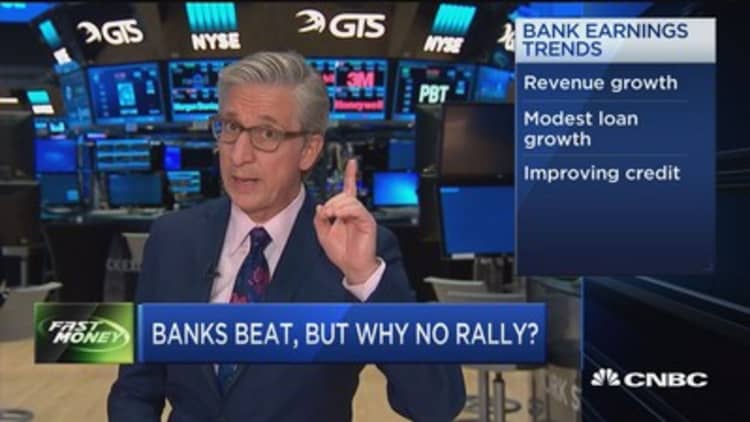Major banks have topped expectations so far this earnings season, helped primarily — and a bit ironically — by post-Brexit market volatility that spurred a surge in bond trading.
The surprise U.K. vote in June to leave the European Union was supposed to destabilize the financial system, but has had limited effect so far. It was more of an event for early summer, and the only evidence of the surprise vote right now is the drop in the pound, said Thierry Albert Wizman, global interest rates and currencies strategist at Macquarie.
Benchmark global sovereign bond yields touched all-time lows in July and August after the Brexit vote. Signals that central bank policy might be changing also contributed to the move in rates, and benchmark yields began recovering in the last several weeks. That's all to the benefit of fixed income and currency trading desks.
"Anything that influences people to trade, buying or selling, that's better for broker-dealers," said Brandon Swensen, co-head of the fixed income desk at RBC Global Asset Management. "Volumes translate to revenues."

As a result, a surge in fixed income trading revenue has been a consistent theme for the earnings and revenue beats from four major banks that have reported so far.
"There's been a certain amount of volatility in interest rates (given) concern about the Fed in raising rates, reluctance of other central banks to continue with" quantitative easing, Macquarie's Wizman said. "Generally customers have sought to protect themselves from a backup in rates."
Goldman Sachs said Tuesday that net revenue in fixed income, currency and commodities client execution rose 49 percent in the third quarter of this year from the same period in 2015, based on accounting including the debt valuation adjustment.
That gain topped a 16 percent rise expected by KBW analyst Brian Kleinhanzl, and followed JPMorgan's 48 percent surge in fixed income markets revenue and a 35 percent jump for Citigroup, based on their earnings reports released last Friday.
"Rates performance was particularly strong, with good client activity, as markets remained active throughout the quarter, post the Brexit vote and in anticipation of central bank actions as well as money market reform," JPMorgan said in its earnings release.
US 10-year Treasury yield year to date
Source: Reuters
JPMorgan holds the largest global market share of fixed income and currency trading by revenue, according to an analysis of rankings from 2013 to the first half of this year by Deutsche Bank Securities. Citigroup is second, followed by Deutsche Bank, the data showed, while Goldman Sachs fell to sixth place in the first half of this year from fifth place last year.
Bank of America also said fixed income trading revenue jumped 32 percent year over year. Morgan Stanley is the only major bank left and is scheduled to report earnings Wednesday. Analysts polled by Reuters expect the company to post earnings per share of 63 cents on revenue of $8.17 billion.
Elevated activity in fixed income trading is expected to continue, especially on growing expectations for a Fed rate hike later this year and market talk of the European Central Bank winding down its asset purchase program known as quantitative easing. That potentially supports further gains in the fixed income trading business for the major banks.
"We think whether it be in the U.S. elections or what's happening with central banks in Asia or Europe, there remain more volatility ahead," Swensen said.
Analysts also pointed to benefits for fixed income desks from the resurgence in corporate debt issuance in the middle part of this year, after the risk-off sentiment last August and at the start of the year.
That said, the third-quarter rise in fixed income trading revenue "wasn't so much about tail winds as it was not having so many headwinds for the quarter, and of course it translated nicely for us," Goldman Sachs Chief Financial Officer Harvey Schwartz said Tuesday on the bank's conference call.
The bank stocks haven't responded significantly. Goldman Sachs shares were up nearly 2 percent midafternoon Tuesday, while the SPDR S&P Bank ETF (KBE) was 1.4 percent lower over the last five trading days.
"The market hasn't given banks credit for trading-related beats this quarter," KBW's Kleinhanzl said in a Tuesday note.
Programming note: Goldman Sachs Chairman and CEO Lloyd Blankfein is scheduled to appear Wednesday on CNBC..


